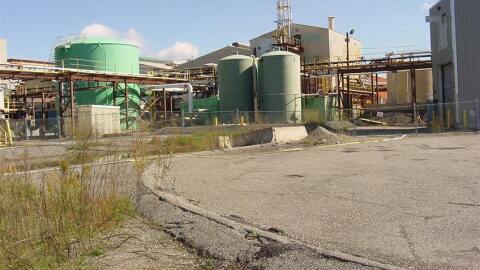ORRINGTON, Maine - The former owners of an Orrington chemical plant must pay for an engineering study to figure out how to clean up toxic mercury dumped in the Penobscot River in the 1960s and 70s.
U.S. District Judge John Woodcock ordered Mallinckrodt US LLC to finance the remediation plan in a ruling issued Wednesday.
Cleaning up the pollution - caused by the HoltraChem Manufacturing Company - will likely be one of the largest and most expensive environmental remediation projects in state history.
HoltraChem dumped 6 to 12 metric tons of mercury into the river. The Maine People's Alliance and The Natural Resources Defense Council first sued Mallinckrodt US LLC - which acquired the HoltaChem site 14 years ago - in an effort to force the clean up.
"I've been working on this case, personally, for almost 17 years," says Nancy Marks. Yesterday was a high point for Marks and the other lawyers representing the plaintiffs in the long-running case. Marks is a senior attorney with the Natural Resources Defense Council.
Earlier rulings in U.S. District and federal appeals courts had found that Mallinckrodt was liable for the pollution. The courts also ordered a group of scientists to study the extent of the damage.
In Wednesday's ruling, Marks says U.S. District Court Judge John Woodcock shifted the the focus from debate over damage to the river to what needs to happen to clean up the mess.
"He really understands the consequences of this pollution to the river and the ecosystem connected to it and the people connected to it," Marks says. "And he cares about it. And he understands that it's important to fix it because it's not going to fix itself."
To come up with a remediation plan, Woodcock is calling on Mallincrockdt, the Natural Resources Defense Council and the Maine People's Alliance to work together, with the help of a "special master," and agree on the hiring of an engineering firm, on the company's dime.
Scientists on the earlier study panel found evidence of eels, crabs and black ducks with mercury limits that exceed the Maine standard for safe human consumption.
Pregnant women cannot safely eat fish caught in the lower Penobscot. And the Maine Department of Marine Resources has been forced to close a seven-mile stretch of the lobster fishery at the mouth of the river due to mercury contamination.
Marks says Judge Woodcock will continue to monitor the case closely.
"You know, if the parties can agree on a firm, and the special master endorses it, then the court will probably endorse it," she says. "But if the parties can't agree on an engineering firm, then there will have to be a process to make a decision about that. And Judge Woodcock would be responsible for that."
Officials with Mallinckrodt would not agree to a taped interview. But in an e-mailed statement, a spokesman for the company said, "Mallinckrodt US LLC will work collaboratively with the Natural Resources Defense Council and the Maine People’s Alliance to work toward an immediate, thorough, open and independent process that will speed the recovery of the Penobscot River and estuary. This ruling allows us to move forward with specific studies to better understand issues we all agree require attention."


